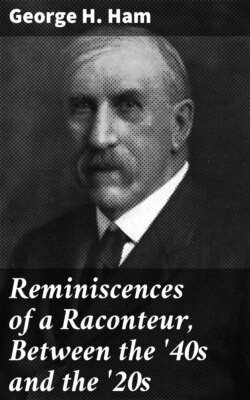Читать книгу Reminiscences of a Raconteur, Between the '40s and the '20s - George H. Ham - Страница 21
На сайте Литреса книга снята с продажи.
The Rivalry Between Smith and Schultz
ОглавлениеTable of Contents
An instance of the rivalry of those early giants was that between Donald A. Smith and Dr. Schultz. Mr. Smith was commissioner of the Hudson’s Bay Company, by far the most powerful commercial organization in the west, which also controlled the only inlet and outlet of trade or travel by its “Kittson Line” of steamers on the Red River. He was active in civic, provincial and federal politics and was considered by the new Canadian influx to be anti-Canadian and non-progressive. Dr. Schultz was a Canadian physician from Windsor, Ontario, who had come to the Red River settlement and established himself in medical practice before the transfer of 1869. He had championed the Canadian cause both before and during the Riel rebellion, and escaped Riel’s vengeance by leaving the country in the middle of winter; but his property was confiscated by the rebels. When he returned in the wake of the first expedition he was of course in strong favor with the constantly increasing Canadian element of the population. At the same time in his practice as a physician he acquired the confidence of many of the native Red River settlers, so that he was in a strong position to contest the claims of Mr. Smith’s political support. He had some aptitude for trade as well as for medicine, politics and real estate, and there is no doubt that his vision of the future was as far reaching and on much the same lines as that of Mr. Smith, who was the first representative from Manitoba in the Canadian Parliament.
Both were men of boundless energy and ambition. They were in opposition to each other on all points and at all times. While Dr. Schultz helped to ultimately defeat Mr. Smith for parliament, the latter finally carried away the prize of railway construction and control that had been the great dream of Dr. Schultz. Although the doctor was finally distanced in the race by his great rival he nevertheless achieved a large measure of distinction. He sat in the Commons and afterwards in the Senate. He was made a knight and for years was lieutenant-governor of Manitoba. Had his health not broken down, his death following, there is no saying how far he might ultimately have gone. These facts are mentioned not to revive ancient animosities but to prove that the men who achieved success did not do so because they had the field to themselves. They had to fight every inch of the way; then as much as now or possibly then more than now.
